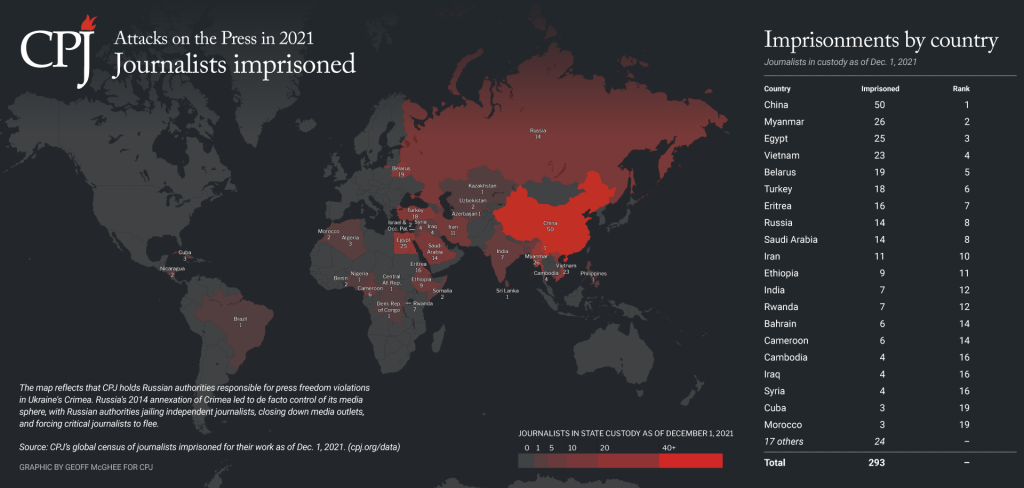China remains the world’s worst jailer of journalists; India and Mexico rank among the deadliest
New York December 9, 2021–The number of journalists behind bars reached a record high in 2021, with 293 behind bars as political upheaval and media crackdowns reflect increasing intolerance for independent reporting around the world. At the same time, targeted killings of journalists persist, with 24 documented by the Committee to Protect Journalists in its annual prison census and survey of attacks on the press.
China continues to be the world’s worst jailer, with CPJ’s 2021 prison census documenting 50 behind bars as the country prepares to host the Beijing Winter Olympics in February 2022. It is followed by Myanmar (26), which arrested scores of reporters in a wave of repression following its February 1 military coup, then Egypt (25), Vietnam (23) and Belarus (19). For the first time, CPJ’s census includes journalists jailed in Hong Kong, such as Apple Daily founder, Jimmy Lai, who was honored with CPJ’s 2021 Gwen Ifill Press Freedom Award. In Ethiopia, an escalating civil war prompted new media restrictions that saw it emerge as the second-worst jailer of journalists in sub-Saharan Africa, after Eritrea.
“This is the sixth year in a row that CPJ has documented record numbers of journalists imprisoned around the world. The number reflects two inextricable challenges — governments are determined to control and manage information, and they are increasingly brazen in their efforts to do so,” said CPJ Executive Director, Joel Simon. “Imprisoning journalists for reporting the news is the hallmark of an authoritarian regime. It’s distressing to see many countries on the list year after year, but it is especially horrifying that Myanmar and Ethiopia have so brutally slammed the door on press freedom.”
Rounding out the top ten were Turkey, Eritrea, Saudi Arabia, Russia and Iran, where leaders routinely weaponize tech and security laws to stifle dissent and continue to flout international norms without consequence. Globally, anti-state charges remain the most common, but this year CPJ also documented at least 17 jailed journalists charged with cybercrimes, which in some cases can result in criminal prosecution for anything published or distributed online.
In Europe, Belarus, which infamously diverted a commercial flight from to arrest journalist Raman Pratasevich, now has 19 journalists behind bars – the country’s highest since CPJ started keeping data on imprisoned journalists in 1992. In Latin America, which historically has had fewer numbers in prison, journalists were jailed in Cuba (3), Nicaragua (2) and Brazil (1), and threats to press freedom intensified across the region.
No journalists were jailed in North America at the time of the census deadline. However, the U.S. Press Freedom Tracker, a partner of CPJ, recorded 56 arrests and detentions of journalists across the U.S. during 2021, with the vast majority occurring during protests.
While countries like Turkey and Saudi Arabia seemingly bucked the trend of putting more journalists in prison than in previous years, this does not signal an improved climate for press freedom, but rather a diversification of censorship, with authorities using tools like surveillance and internet shutdowns along with prisoner releases under conditions that deny the very notion of freedom.
Globally, India had the highest number – four – of journalists confirmed to have been killed in direct retaliation for their work, and another killed while covering a protest. Mexico, however, remained the Western hemisphere’s deadliest country for journalists, with three murdered for their reporting and the motives for six other killings under investigation.
Of journalists killed worldwide this year, nearly 80% were murdered. In democratic and authoritarian regimes alike, the cycle of impunity remains, sending a chilling message that perpetrators will not be held accountable.
This week the Summit for Democracy, a new foreign policy centerpiece of the United States, includes participation by at least seven countries on CPJ’s prison census, several of which also have a record of impunity, including Brazil, India, Iraq, and the Philippines, where authorities continue to retaliate against independent journalists like this year’s Nobel Peace Prize winner Maria Ressa, issuing yet another trumped up charge against her this week.
Despite the grim picture painted by the report, CPJ continues to fight against censorship. CPJ advocacy contributed to the early release of at least 100 imprisoned journalists worldwide in 2021. Recently, as part of A Safer World For The Truth, CPJ and partners launched a People’s Tribunal to address impunity in journalist killings. The tribunal, a form of grassroots justice, relies on investigations and high-quality legal analysis involving specific cases to provide a framework for justice and accountability.
CPJ’s prison census is a snapshot of those incarcerated at 12:01 a.m. on December 1, 2021. It does not include the many journalists imprisoned and released throughout the year; accounts of those cases can be found at http://cpj-preprod.go-vip.net. CPJ’s analysis of journalists killed for their work is based on data as of December 1, 2021. CPJ’s website is continually updated at cpj.org/data/killed/
***
CPJ is an independent, nonprofit organization that works to safeguard press freedom worldwide.
Note to Editors:
CPJ’s report is available on cpj.org in multiple languages. CPJ experts are available for interviews.
